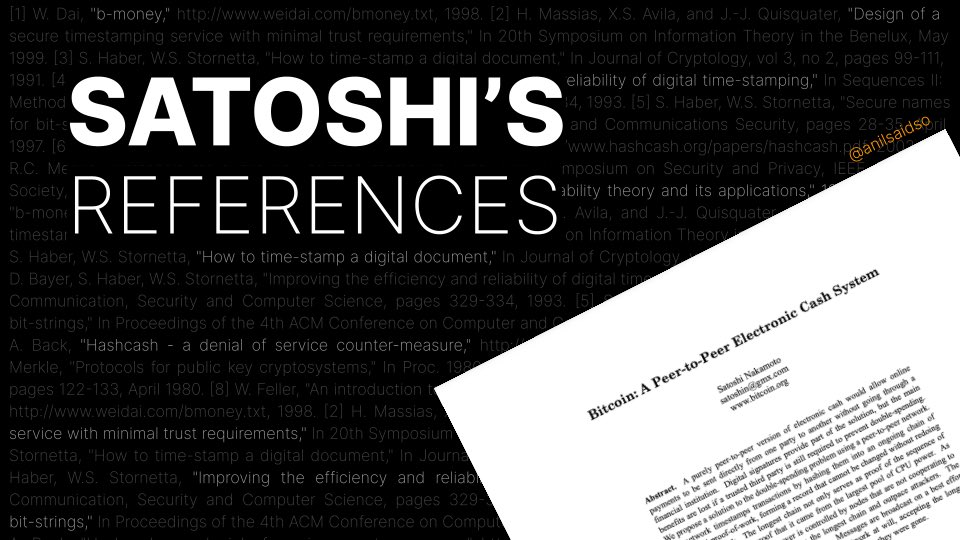
I try to highlight content that’s insight-dense, grounded in first-principles and easy to grasp.
@stephanlivera & @JeffBooth dissect the signposts we are currently witnessing as two fundamentally opposing economic systems start to collide.
🟠x🟢
THREAD.
@stephanlivera & @JeffBooth dissect the signposts we are currently witnessing as two fundamentally opposing economic systems start to collide.
🟠x🟢
THREAD.

1/ “it is super difficult to stop technology that empowers human beings, because you have to lie more to be able to stop it. You have to deceive.”
https://twitter.com/anilsaidso/status/1375222037157879812?s=20
2/ “on one side, you have technology that’s trying to drive prices down. And the only way to essentially stop that is to concentrate control and government more and more and more.
..by printing money (really stealing from people). It concentrates wealth and power on one side.”
..by printing money (really stealing from people). It concentrates wealth and power on one side.”
3/ “one system has to have more and more corruption and more lies to protect it. And one system is really the truth showing all the time, that thing is causing more people to look and say, ‘what is this?’”
https://twitter.com/anilsaidso/status/1285594240337108996?s=20
4/ “Now they’re starting to realize that their entire system they live in is based on a fraud and they’re starting to come on.
Once that starts to happen, it just reinforces on itself. And that’s what I think [is] happening.”
Once that starts to happen, it just reinforces on itself. And that’s what I think [is] happening.”

5/ “You’re caught in a system that reinforces it all the time.
..there’s many people including fiat economists that actually haven’t chased this all the way down to the ground. They’re just parroting what they’ve thought from somebody else.”
..there’s many people including fiat economists that actually haven’t chased this all the way down to the ground. They’re just parroting what they’ve thought from somebody else.”
https://twitter.com/anilsaidso/status/1333434480619450368?s=20
6/ “these opposing forces are getting worse and worse.
when you just think about in a personal relationship..if you trusted somebody and they deceived you and they completely lied to you for their own personal gain, would you trust them again?”
when you just think about in a personal relationship..if you trusted somebody and they deceived you and they completely lied to you for their own personal gain, would you trust them again?”
7/ “a whole bunch of Bitcoiners end up looking like they’re wearing tinfoil hats on a whole range of issues, because you have mistrust in the money layer.
And once you have a mistrust in the money layer, as a consequence, you have to have mistrust everywhere else.”
And once you have a mistrust in the money layer, as a consequence, you have to have mistrust everywhere else.”
8/ “when you see El Salvador, a lot of people in the traditional media went with ‘highest crime rate’, with very little understanding that crime is a second order derivative of people not being able to pay their bills because there’s a shitty economy.
https://twitter.com/anilsaidso/status/1308096495443259393?s=20
9/ “that system all around the world forces many people into a life of despair and crime.
So it’s a system problem. It’s not people. People are rational actors in a broken system.”
So it’s a system problem. It’s not people. People are rational actors in a broken system.”
10/ “El Salvador, Nigeria and a whole bunch of other countries are starting to really take this seriously because it’s bringing on..millions of people into this new economy at a rate that’s increasing faster and faster.”
https://twitter.com/anilsaidso/status/1328793901591719941?s=20
11/ “there’s probably 20 different countries that could be next. And I think they’re going to fall like dominoes..
..the IMF is scared and they rightfully should be..you’re going to get some pushback here, but it’s not going to be enough to stop it.
..the IMF is scared and they rightfully should be..you’re going to get some pushback here, but it’s not going to be enough to stop it.
https://twitter.com/anilsaidso/status/1281695979171753984?s=20
12/ “And if they really tried to stop it would move underground and it would keep going just like countries that have stopped and or tried to regulate it and everything else, it just moves underground and it actually probably moves faster.”
https://twitter.com/anilsaidso/status/1383269663811936260?s=20
13/ “I said to a politician in Canada: ‘listen, if government came after this in a big way, I’d just get on a plane. I take my businesses and I move somewhere else because I know what’s coming.’“
https://twitter.com/anilsaidso/status/1266789199316791297?s=20
14/ “something I don’t think I’ve ever said on a podcast, but I’ve thought a lot about recently:
Are property rights themselves and our infatuation about owning a home, a derivative of a system that has to leverage us into control?”
Are property rights themselves and our infatuation about owning a home, a derivative of a system that has to leverage us into control?”
https://twitter.com/anilsaidso/status/1405277895711285250?s=20
15/ “when you think about property rights through that lens, ..you can’t take the property with you..it can be taken from you..
Bitcoin is literally the only property right..that can’t be taken from you."
Bitcoin is literally the only property right..that can’t be taken from you."
https://twitter.com/anilsaidso/status/1405738742078349320?s=20
16/ “so now just ask yourself, what would housing would be worth without 185 trillion of stimulus over 20 years?
It’s not even close to what real markets should look like. It’s all an illusion based on the printing of money or the manipulation of money.”
It’s not even close to what real markets should look like. It’s all an illusion based on the printing of money or the manipulation of money.”
https://twitter.com/anilsaidso/status/1406298966891798529?s=20
17/ “it’s not bad people, it’s a bad system that they’re caught in that they don’t know how to get out of.
What I was so frustrated with after writing my book, there hasn’t been..a real credible first-principles [rebuttal].”
What I was so frustrated with after writing my book, there hasn’t been..a real credible first-principles [rebuttal].”
https://twitter.com/anilsaidso/status/1306287762228695040?s=20
18/ “once you see what’s happening here kind of on both systems and you see Bitcoin truly is about empowering people.
Whereas every other system, I wish this wasn’t true, but it’s about power over other people, dominion over other people.”
Whereas every other system, I wish this wasn’t true, but it’s about power over other people, dominion over other people.”
19/ “If you have an ego going into Bitcoin, you’ve got a problem. [some] people want it to be about them, and it’s not about them, it’s about a monetary layer that removes that from the system.” 

20/ “You don’t want heroes of the community. You want advocates..
..then hopefully you just kind of move back to bringing more people on because it’s better for you.
..what matters the most is the holder network effect.”
..then hopefully you just kind of move back to bringing more people on because it’s better for you.
..what matters the most is the holder network effect.”
21/ “And that’s where I think @michael_saylor has been brilliant- astonishing explanations of why you should think of it as a reserve asset. You should be trying to hold it.”
https://twitter.com/anilsaidso/status/1330561477128818688?s=20
22/ “what an exciting time to be alive. If you think about all of these different changes that are happening at light speed..
and you think that for the first time in human history, you could [have] money [that’s] decentralized and not [under] one person’s control”
and you think that for the first time in human history, you could [have] money [that’s] decentralized and not [under] one person’s control”
23/ “So the world’s changing really fast and for curious people, that kind of, aren’t afraid of that change they want to explore it and say, where does this go? What are the new rules look like? What does that look?
Just abundance, abundance everywhere.”
Just abundance, abundance everywhere.”
https://twitter.com/anilsaidso/status/1366443753758552067?s=20
• • •
Missing some Tweet in this thread? You can try to
force a refresh

















